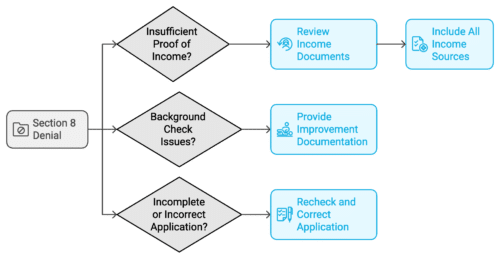
How to Check if a Landlord or Rental Agency is Legitimate
December 15, 2023
What to Do If You’ve Been Scammed in a Rental Agreement
February 2, 2024You’ve waited for a response on your Section 8 application, hoping it would help you secure affordable housing. But instead, you receive a denial letter. It can feel like a dead end, but don’t give up. Many people succeed in overturning Section 8 denials through appeals. This guide explains the common reasons for denial, how to effectively appeal, and tips for a successful reapplication if necessary.
Common Reasons for Section 8 Denial
HUD (Department of Housing and Urban Development) enforces strict eligibility requirements for Section 8. Denials often come down to specific issues related to income, background, or application errors. Here are the main reasons applications get denied and how you can address each one:
- Insufficient Proof of Income: Your income must fall within HUD’s limits, usually 50% of the area median income, although most accepted applicants have incomes below 30%. If your rejection cites “lack of income proof,” it might mean the income details in your application were unclear or incomplete.
- What to Do: Review your income documents carefully. Make sure you’ve included every source, such as part-time jobs, alimony, or child support. Adding these documents in your appeal strengthens your case.
- Background Check Issues: A history of evictions or certain criminal records may lead to denial. HUD requires housing authorities to check for potential risks to other tenants or property.
- What to Do: If your denial relates to previous evictions or minor offenses, provide documents showing your efforts to improve, like letters from recent landlords or proof of rehabilitation. This can be persuasive evidence in an appeal.
- Incomplete or Incorrect Application Forms: Simple mistakes—like missing sections or incorrect information—can cause an application to be rejected.
- What to Do: Carefully recheck your application and fill in any blanks. If possible, ask a friend or advocate to review it too. Submitting a corrected application with your appeal shows you’re serious and organized.
How to Appeal a Section 8 Denial
Appealing a Section 8 denial takes organization and attention to deadlines, but it’s a process many applicants navigate successfully.
- Gather Your Documents: Collect all paperwork related to your application, such as the denial letter, your original application, income statements, rental history, and any other documents you can use to support your case.
- Tip: Make copies of everything. Organized documents demonstrate to the appeals officer that you’re well-prepared and serious.
- Know Your State’s Appeal Deadlines: Each state has its own deadline for filing Section 8 appeals. For example:
- California and Colorado: 10 days from the denial date
- Florida: 14 days
- New York: 30 days
- Check with your local housing authority for the exact timeframe.
- Consider Legal Assistance: A lawyer familiar with housing law can strengthen your appeal, especially if your case is complex.
- Tip: Seek free or low-cost legal aid through nonprofit organizations specializing in housing.
- Prepare for the Appeal Hearing: If your appeal is accepted, you’ll have a hearing to present your case. This is an informal meeting where you can provide new evidence to counter the denial.
- Steps for Success:
- Bring every document: denial letter, proof of income, rental history, etc.
- Be clear and concise: Explain any mistakes in the application and emphasize any improvements since your initial submission.
- Show rehabilitation efforts if applicable: This can help if your denial was based on past criminal or rental issues.
- Steps for Success:

After the Hearing: What Happens Next?
After the hearing, the officer reviews your case and issues a decision, usually within a few weeks. If they overturn the denial, your application moves forward. If they uphold it, ask about other local housing options or resources that might be available.
Options if Your Appeal Is Unsuccessful
If your appeal doesn’t succeed, you can reapply, especially if your situation has changed. A reapplication is sometimes the best option to overcome initial issues and present a stronger case.
Tips for a Stronger Re-application
- Check All Documentation: Double-check every source of income. Missing details or misreported income can trigger another denial.
- Build a Strong Rental History: If past rental history was an issue, maintain a positive record with your current landlord. Ask for a letter of recommendation when you reapply.
Frequently Asked Questions
What if I’m Denied Due to a Criminal Record?
Certain offenses disqualify applicants permanently, but others may be eligible for appeal if there’s evidence of rehabilitation.
Can I Apply for Section 8 in Multiple States?
Yes, but be aware that waiting lists and local preferences often vary.
What Happens if I Miss the Appeal Deadline?
Missing the deadline typically means losing your appeal rights, although you may still be able to reapply.
Are There Organizations to Help with Appeals?
Yes, housing nonprofits and legal aid groups offer assistance with appeals.
Stay Persistent and Keep Your Documentation Organized
Denials can feel discouraging, but they aren’t the end of your Section 8 journey. If you know your rights, act promptly, and organize your case, you’re more likely to succeed. The Section 8 appeal process is designed to give applicants a fair chance, so stay committed, prepare thoroughly, and advocate for the affordable housing you need.




